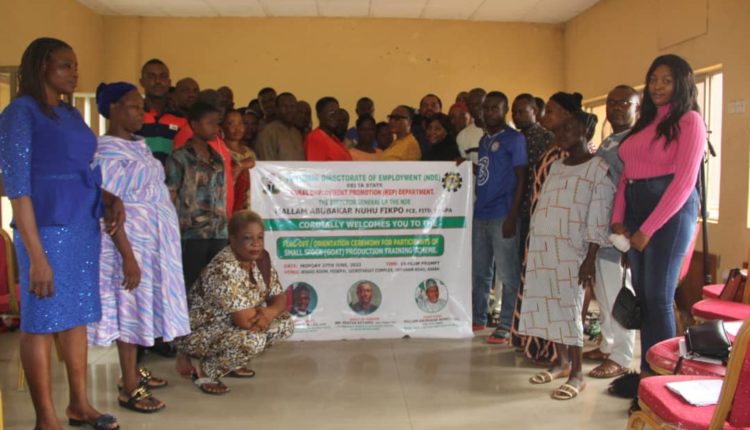Tuesday marked the start of a five-day recruiting and training session for 50 unemployed youths chosen from Delta State as part of the small stock (goat) production training plan conducted by the National Directorate of Employment’s Rural Employment Promotion Department.
Director-General of the NDE, Mallam Abubakar Nuhu Fikpo, stated in a keynote speech at the flag-off and orientation ceremony in Asaba, the state capital, that the program’s goal is to train 900 unemployed youths in goat production technology along its value chain using the revolving model of empowerment in 18 chosen states of the federation, with three states per geopolitical Zone.
According to Fikpo, who was represented by Mrs. Enebeli Roseline, Acting Zonal Director, South-South Zone, the training is a part of the directorate’s effort to slow the country’s rapid increase in unemployment, and the participants should feel privileged to have been chosen for the program, which Fikpo called a once-in-a-lifetime opportunity.
The Rural Employment Promotion (REP) programme, he continued, “is aimed at revamping agriculture to boost the production of food and fibres as well as provide job opportunities for graduates of agriculture and school leavers trained in agricultural production. The training under this programme covers crop production, processing, and livestock management.”
In particular, he listed goals of Small Stock (Goat) Production training as wealth creation and improved livelihood for rural dwellers, poverty reduction, decreased rural-urban migration, and provision of raw material for leather manufacturing industries, in addition to job opportunities for the unemployed youths.
According to him, “in Nigeria, goat production is an economically viable business venture because its value chain for commercial production has great employment potential. It enjoys a very wide market share with all products in high demand.
“Goat is a source of meat, milk, hide, skin and fertilizers from droppings. The skin is used by the tanning industries for the manufacture of leather for local and foreign exchange earnings,” he added.
In summary, he said engaging unemployed youths in the value chain, “plays an important role in the socio-economic, environment and religious life of the farming communities in terms of income and supply of food for local population and the country at large. The great potential inherent in goat production business include production of meat, milk, hide and skin manure.”
Therefore, he advised the recipients to fully capitalize on the chance to change their “life from job seekers to employers of labor.”
In keeping with his pledge of “jobs for all,” Mr. Onyeogo Sylvanus praised the training program as yet another important milestone in the directorate’s fight against unemployment.
He thanked the DG for choosing Delta State as one of the states to participate in the South-South training program for unemployed women and youth who have expressed interest in goat farming.
The training, he said, is split into the theoretical and practical demonstration in the experiential Small Stock (Goat) production farm, assuring that “the theoretical curriculum is well-structured to equip the participants with the competence and experience they needed to go into goat production business in Delta State.”
The practical demonstration, he continued, “is designed to expose the trainees or participants to the practical management of goat fattening and breeding, using the revolving model of empowerment in goat production.”
Urging participants to pay attention so as to reap the immense benefit of the training, Onyeogo assured that “goat production is a viable business due to its value chain potential which could be harnessed to provide employment opportunities for the teeming unemployed youths in Delta State, in particular and the nation at large.
“Goat meat is a good delicacy that is in high demand across the country and is not forbidden by any religious group. Apart from goat meat, the hide and skin of goat is a raw material for tanning industries for the production of leather for local and foreign exchange earnings,” he stressed.









